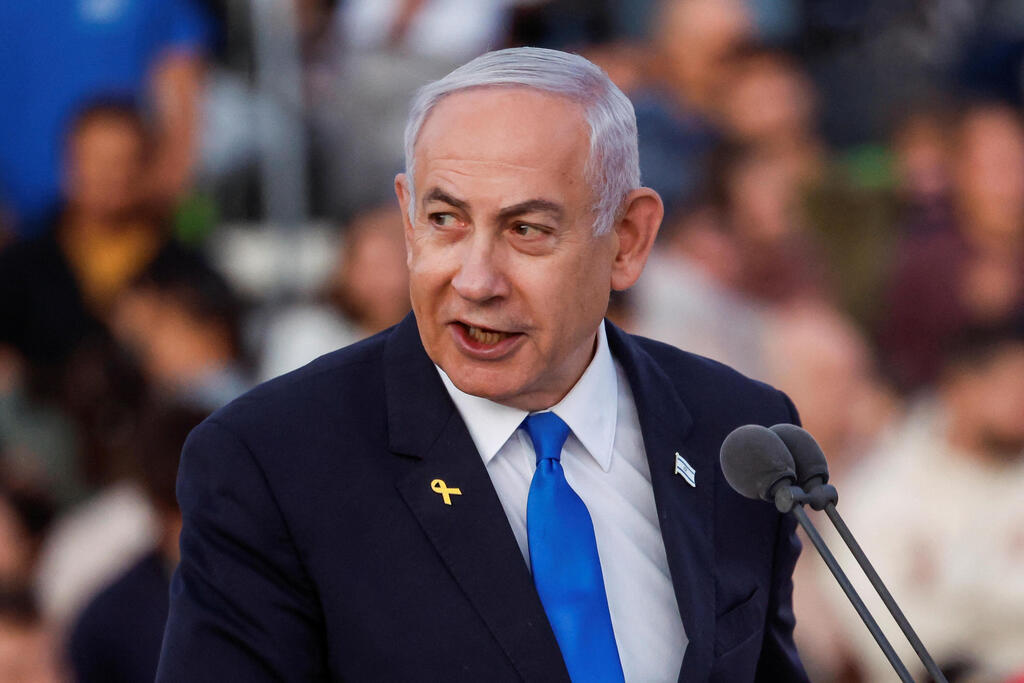Getting your Trinity Audio player ready...
Prime Minister Benjamin Netanyahu on Tuesday offered $5 million for the release of each hostage held by Hamas, along with safe passage for the captors to a third country, in a bid to secure their freedom.
Officials are working to publicize the offer through various channels, hoping to incentivize those holding the hostages.
2 View gallery


Demonstrator in Tel Aviv calling for release of hostages
(Photo: REUTERS/Thomas Peter)
Israeli officials also believe that a "renewed momentum" for advancing a deal could emerge after the U.S. elections. Sources familiar with the matter said Tuesday that communication with mediators is ongoing, primarily to explore whether Hamas can be persuaded to soften its demands, which currently include ending the war and a full Israeli withdrawal from Gaza.
Several options are reportedly on the table, including a limited initial deal (similar to Egypt's proposal), a phased agreement or a single comprehensive deal. However, all options face significant challenges.
Prime Minister Benjamin Netanyahu held an extended assessment on the hostage situation Sunday night, with more talks expected in the coming days. Netanyahu also met with families of the hostages Monday evening.
Officials anticipate that the U.S. election results will greatly impact negotiations, with President Joe Biden reportedly determined to finalize a deal before his term ends in January. The election outcome could influence mediators—Egypt and Qatar—as well as Hamas, as all parties seek to demonstrate their willingness to reach an agreement and end the war.
'There will be no deal right now'
A senior member of the negotiating team for the hostage deal updated families this week, saying that Israel and Hamas have been unable to reach any agreement or compromise on ending the war in Gaza. "There is someone to talk to, but nothing to talk about," the official said, describing the current state of negotiations. "There is a clear understanding within the defense establishment that the hostages will not be returned unless the war in Gaza ends, and right now, there is no willingness from the government to end the war."
Reports Monday from Jerusalem indicated significant pessimism regarding the negotiations. Hamas informed mediators that it refuses to agree to any deal short of a complete cessation of the war and a full Israeli withdrawal from Gaza. The terror group has effectively rejected proposals for smaller, more limited deals.
"The truth must be acknowledged—there will be no deal right now. Not a small one, not a big one, not even a partial one," sources familiar with the matter said. "The real question is whether the time has come to save the remaining hostages and end the war in Gaza. That is the entire discussion, and this is what’s happening behind the scenes. There will be no deal without a decision to end the war in Gaza. We must face the facts."
Despite this, the prevailing understanding in Jerusalem is that if Prime Minister Netanyahu opts for a deal tied to ending the war, his government would likely collapse, making such a scenario highly unlikely. There is speculation that Netanyahu may seek to link a major deal to normalization with Saudi Arabia, but that could take many months to materialize. In the meantime, the hostages, who are in constant danger, may not survive long enough for such an agreement to be reached.
As the parties await the outcome of the U.S. elections—and its impact on the negotiations—former hostage survivor Maya Sham called on the next U.S. president, whether Kamala Harris or Donald Trump, to do everything in their power to secure the hostages' release. "I came here to cry out to the world and to the world's greatest superpower, to demand that whoever is elected in the United States must do everything to release the hostages—not some, not a few. These are our brothers and sisters, suffering every day, every hour, with no one answering their cries," Sham said at the "Shurat HaDin" Conference on Combatting Antisemitism.
The Hope Forum, representing some of the hostage families, welcomed the setting of a financial offer for the release of the hostages. "The value of the hostages' lives outweighs the importance of strict justice, especially when it protects the lives of other Israeli citizens. We support this initiative and want to see all of our children brought home," the forum said.
Get the Ynetnews app on your smartphone:




